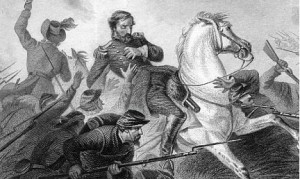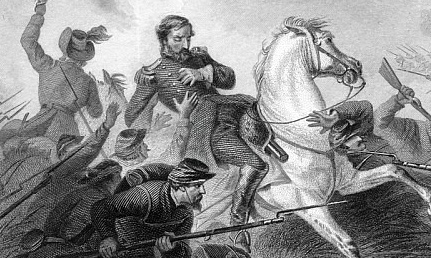The Right to be Wrong
 The total population of the United States was reduced by 2% as a result of the casualties inflicted by the Civil War.1 It wasn’t fought over economic disputes. Financial disagreements are quickly revealed as trivial once the horrors of war park themselves in your front yard. And while it’s not inaccurate to say that the war was fought over slavery, there’s more to it than that. The bottom line is that the Civil War was fought over the way a human being was to be defined.
The total population of the United States was reduced by 2% as a result of the casualties inflicted by the Civil War.1 It wasn’t fought over economic disputes. Financial disagreements are quickly revealed as trivial once the horrors of war park themselves in your front yard. And while it’s not inaccurate to say that the war was fought over slavery, there’s more to it than that. The bottom line is that the Civil War was fought over the way a human being was to be defined.
There were four political parties that came to the table during the Presidential election in 1860: The Northern Democrats, the Southern Democrats, the Republican Party and the Constitutional Union Party.2 Each of these parties was defined by their stance on slavery. The reason the Republican Party chose newcomer Abraham Lincoln as their champion is because of the way he was able to identify the core issue at the heart of the slavery debate.
Many were distracted by the South’s justification of slavery by categorizing as a matter of “state’s rights.” Lincoln handily dismantled that argument. At one point he said: “…the doctrine of self-government is right – absolutely and eternally right,” but argued that “it has no just application” to slavery. “When the white man governs himself,’ he asserted, “that is self-government; but when he governs himself, and also governs another man, that is more than self-government – that is despotism. If the negro is a man, why then my ancient faith teaches me that ‘all men are created equal’; and that there can be no moral right in connection with one man’s making a slave of another.”3
And the thing is, the South did not simply want to be left alone. As new territories were being added to the Union, the South was insistent that these new states were to be added as slave states.4 And when South Carolina announced its decision to secede, it simultaneously confiscated all Federal property and infrastructure and claimed it as its own. 4 This was not autonomy that was being desired, it was an attempt to gain authority over that which defined the nature of a human being as well as any resource that could aid them in their bid for control. That is what caused the North and South to war against one another.
What makes this topic important is that you will often hear deviations from Truth asserted in the context of a right to be left alone or a right to be happy. On the surface, it appears correct. But if the issue in question is predicated on something that is morally wrong, then it’s no longer a question of rights. The South did not have the “right” to enslave an entire race, nor did it have the “right” to confiscate property that was not their own. They did have the right to govern themselves, but not to the extent that it violated the rights of others.
Today we debate over things like same sex marriage and any one of a number of entitlements from health insurance to employment. The pursuit of one’s own happiness is part of our philosophical foundation as a nation. But that same philosophy references an Absolute as the justification for our ability to secure the blessings of life and liberty. When we step outside the moral boundaries defined by that Absolute, we are no longer exercising our “right” as much as we are simply rebelling against that which is right. And while rhetoric and legal sounding verbiage can veil that for a season, inevitably it will be revealed for what it is – immoral, unjust and just plain wrong.
The Civil War was both tragic and costly. Whether it could’ve been avoided is speculative, but the lessons to be learned in terms of being vigilant in recognizing a perversion of the Truth are not vague or illusive. And those lessons need to be deployed now as we process what’s going in our culture and in our government. The result of apathy may not be a Civil War, but left unchecked, the result will not be healthy.
Postscript: Check out this video from Prager University. It’s excellent and reinforces the point about the Civil War being about slavery and slavery alone – http://www.prageruniversity.com/History/Was-the-Civil-War-About-Slavery.html
- “Civil War Casualties”, “Civil War Trust”, http://www.civilwar.org/education/civil-war-casualties.html, accessed June 6, 2014
- By the late 1850s, the Democratic Party was split over the issue of slavery. Northern Democrats generally opposed slavery’s expansion while many Southern Democrats believed that slavery should exist across the United States. In the presidential election of 1860, the Democratic Party split in two, with Stephen Douglas running for the Northern Democratic Party, and John C. Breckinridge representing the Southern Democratic Party. Two other political parties competed in this election as well. One of these parties was the Republican Party, with Abraham Lincoln as its candidate. Lincoln and the Republican Party opposed slavery’s expansion. The other party was the Constitutional Union Party. The party’s candidate, John Bell, hoped to compromise the differences between the North and South by extending the Missouri Compromise line across the remainder of the United States. Slavery would be permitted in new states established south of the line, while the institution would be illegal in new states formed north of the line. The Northern and Southern Democratic Parties only officially existed in the election of 1860. (“Northern Democrat Party”, http://www.ohiohistorycentral.org/w/Northern_Democratic_Party, accessed July 3, 2013)
- “Team of Rivals”, Doris Kearns Goodwin, Simon and Shuster, 2006, page 203
- Ibid, p162
The Missouri Compromise of 1820 was a piece of legislation that prohibited slavery from those territories procured from France as part of the Louisiana Purchase. The Kansas-Nebraska Act effectually nullified that act by stating that states could choose by “popular sovereignty” whether or not they were to be slave or free. The problem was that those who had the resources and political clout to affect the outcome of these supposedly democratic procedures were predominantly wealthy slave owners. It wasn’t a compromise, it was a political maneuver that further revealed the true motivation of the more vocal proponents of the pro-slavery faction, while simultaneously galvanizing those who opposed it.
5.Ibid, p297








Leave a Reply
Want to join the discussion?Feel free to contribute!